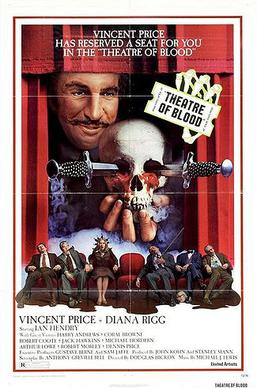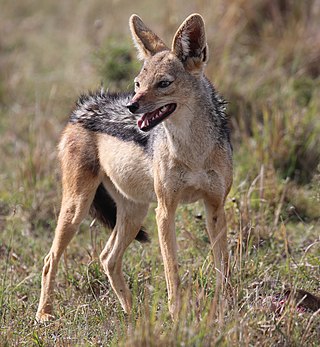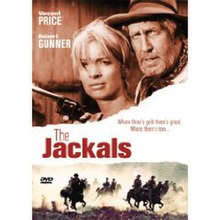
Jackals are canids native to Africa and Eurasia. While the word "jackal" has historically been used for many canines of the subtribe canina, in modern use it most commonly refers to three species: the closely related black-backed jackal and side-striped jackal of Central and Southern Africa, and the golden jackal of south-central Europe and Asia. The African golden wolf was also formerly considered a jackal.

Edward Charles Morice Fox is an English actor and a member of the Fox family.

Theatre of Blood is a 1973 British horror comedy film directed by Douglas Hickox and starring Vincent Price and Diana Rigg.

The black-backed jackal, also called the silver-backed jackal, is a medium-sized canine native to eastern and southern Africa. These regions are separated by roughly 900 kilometers.

The golden jackal, also called the common jackal, is a wolf-like canid that is native to Eurasia. The golden jackal's coat varies in color from a pale creamy yellow in summer to a dark tawny beige in winter. It is smaller and has shorter legs, a shorter tail, a more elongated torso, a less-prominent forehead, and a narrower and more pointed muzzle than the Arabian wolf. It is listed as Least Concern on the IUCN Red List due to its widespread distribution and high density in areas with plenty of available food and optimum shelter.

The side-striped jackal is a canine native to Central and Southern Africa.

Michael Sarrazin was a Canadian actor. His most notable film was They Shoot Horses, Don't They?.
Canid hybrids are the result of interbreeding between the species of the subfamily Caninae.

Yellow Sky is a 1948 American Western film directed by William A. Wellman and starring Gregory Peck, Richard Widmark, and Anne Baxter. The story is believed to be loosely adapted from William Shakespeare's The Tempest. The screenplay concerns a band of reprobate outlaws who flee after a bank robbery and encounter an old man and his granddaughter in a ghost town.
Flaming Frontiers (1938) is a Universal movie serial starring Johnny Mack Brown. It was a remake of Heroes of the West (1932). It was re-edited into a TV series in 1966. Much of the material was reused in Lon Chaney Jr.'s 1942 serial Overland Mail.
Killarney Film Studios was a South African film studio established in Johannesburg by New York native and business tycoon Isidore W. Schlesinger in 1915 and is regarded as "the first motion picture studio in Africa". Schlesinger moved to South Africa in 1894, against his family's wishes, when he read about the discovery of gold in Witwatersrand. In 1913, having accumulated wealth throughout various ventures, he ventured in to the entertainment industry in 1913 when he purchased the Empire Theatre in Johannesburg for £60,000 and converted what was an "insolvent" business into a flourishing one named African Consolidated Theatres, which worked on the national distribution of content like variety shows and films from the Cape of Good Hope to the Zambezi River.

Robert Russell was an English actor known for a memorable supporting role as John Stearne alongside Vincent Price in the classic British horror film Witchfinder General (1968).
Man's Lust for Gold is a 1912 American short silent drama film directed by D. W. Griffith and starring Blanche Sweet.
Robert D. Webb was an American film director. He directed 16 films between 1945 and 1968. He won the Academy Award for Best Assistant Director for In Old Chicago, the last time that category was offered.
The Cape Town Affair is a 1967 South African spy film directed and produced by Robert D. Webb, written by Dwight Taylor, produced by the 20th Century Fox at Killarney Film Studios in South Africa. The film stars Claire Trevor, James Brolin, and Jacqueline Bisset. It is a remake of the 1953 picture Pickup on South Street.

Coast of Skeletons is a 1965 adventure film, directed by Robert Lynn and starring Richard Todd and Dale Robertson. It is a sequel to the 1963 film Death Drums Along the River, and just as that film, it uses the characters from Edgar Wallace's 1911 novel Sanders of the River and Zoltán Korda's 1935 film based on the novel, but placed in a totally different story. Coast of Skeletons was released in Germany as Sanders und das Schiff des Todes/ Sanders and the Ship of Death.

Blazing Bullets is a 1951 American Western film directed by Wallace Fox and starring Johnny Mack Brown, Lois Hall and Stanley Price.
Should a Husband Forgive? is a 1919 American drama film written and directed by Raoul Walsh. The film stars Miriam Cooper, Beatrice Beckley, Eric Mayne, Vincent Coleman, Lyster Chambers and Percy Standing. The film was released on November 1, 1919, by Fox Film Corporation.

Kloofendal Nature Reserve is a municipal nature reserve in Roodepoort, South Africa. It is one of the first nature reserves in Johannesburg. It is also recognized as the place where gold was first mined in Johannesburg. The old gold mine can be visited by appointment. There are hiking trails and a small dam.
The Ciskei National Independence Party (CNIP) was a political party in the nominally independent South African homeland of Ciskei. It was founded and led by Lennox Sebe. The party advocated cooperation with the South African government. The party governed Ciskei from 1973 until the 1990 coup d'état by Oupa Gqozo.












